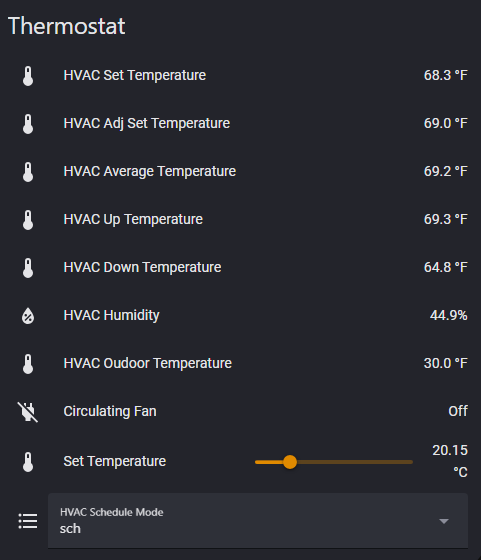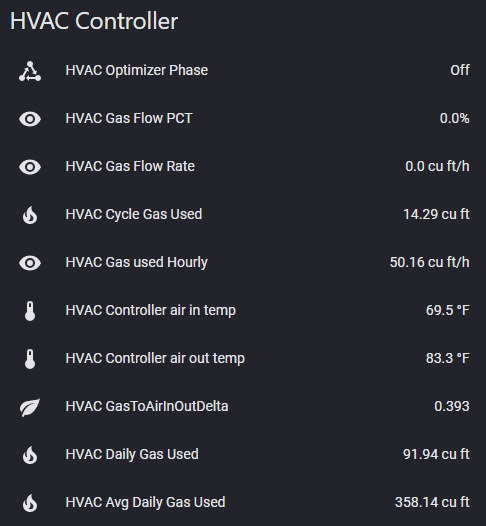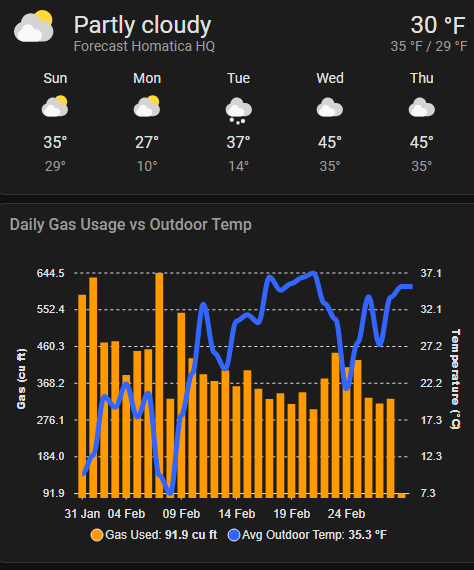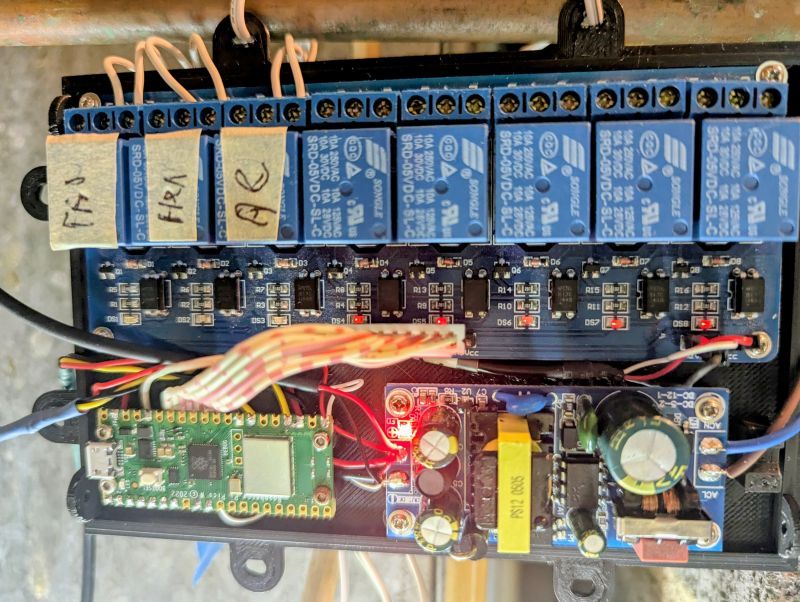⚙️ Smart HVAC Controller: Privacy-First Optimization
This Homatica research initiative by Claudio Cabete explores real-time HVAC performance monitoring and adaptive control strategies to improve comfort and efficiency while maintaining full local data ownership.



🔍 Why I'm experimenting with this Smart HVAC Controller
Traditional thermostats react slowly and waste energy, while many smart thermostats rely on cloud services, risking your privacy. My goal was a privacy-first, locally hosted HVAC controller that anticipates thermal behavior, adapts system output dynamically, and adapts dynamically—all without third-party data sharing. This project embodies Homatica’s mission: modular, resilient, and customizable home automation built with open-source tools like Home Assistant.
🧰 Hardware Setup
- 3 × Raspberry Pi Pico W: All run identical MicroPython firmware for interchangeability.
- Main Pico W Controller:
- 8-channel relay board for switching.
- 2 temperature sensors for precise monitoring.
- 2 Pico Ws: Each with a temperature sensor for distributed zone monitoring.
- Raspberry Pi 4 Hub: Hosts:
- Docker, MariaDB, Home Assistant.
- FastAPI, Nginx, MQTT broker, Portainer.

All components communicate via MQTT, with the Pi 4 orchestrating logic and logging telemetry to MariaDB.
🧠 How the HVAC Controller Works
- Dynamic Scheduling: Uses a FastAPI schedule endpoint to set HVAC modes and setpoints, with override and fallback logic.
- Stateful Control: Tracks states to prevent erratic switching, enforcing minimum run/off times.
- Circulation Fan Logic: Manages post-run cooling, hysteresis, and cycle-based fallbacks.
- Stale Data Protection: Validates timestamped thermostat data to ensure safe operation.
🔧 Technical Highlights
- Runtime-tunable hysteresis and dead band for precise control.
- Debounce and timestamp guards to avoid erratic behavior.
- Modular YAML and MQTT-based configuration for scalability.
- Robust MQTT reconnect logic and availability publishing.
- Fallbacks for expired overrides and missing schedules.
Sample MicroPython Code
import machine
import time
from umqtt.simple import MQTTClient
# Servo control example
servo = machine.PWM(machine.Pin(16))
servo.freq(50)
def set_servo_duty(duty):
servo.duty_u16(int(duty * 65535 / 100))
# MQTT setup
client = MQTTClient("pico_w", "mqtt_broker_ip")
client.connect()
def on_message(topic, msg):
if topic == b"hvac/ctrl/outputs":
duty = float(msg.decode().split("adaptive_output:")[1])
set_servo_duty(duty)
client.set_callback(on_message)
client.subscribe("hvac/ctrl/outputs")
🧾 Sample Logs
🕒 Sep 25 11:27:59 — Active Schedule
Active schedule selected:
eid=0
mode=hold
sch_type=AC
sch_hvac_mode=AC
setpoint=24.7
fan_on=0
fan_off=1800
⚙️ Inputs Snapshot
HEAT_TEMP_TRIGGER: 18
AC_TEMP_TRIGGER: 26
heat_max_setpoint: 20
ac_max_setpoint: 25
dead_band: 0.7
ac_min_run_secs: 900
ac_min_off_secs: 300
ac_fan_delay_secs: 60
furnace_fan_delay_secs: 90
hvac_mode: AC
sch_mode: AC
settemp: 24.7
setadjtemp: 24.7
fan_cycle_on_secs: 0
fan_cycle_off_secs: 1800
udv_hvac_mode: AC
🌦️ Weather:
temperature: 72°F
humidity: 97%
condition: rainy
forecast:
temperature: 77°F
templow: 72°F
humidity: 95%
wind_speed: 13.17 km/h
uv_index: 5.3
precipitation: 0.47
datetime: 2025-09-25T16:00:00+00:00
🌡️ Sensors:
HVAC Central Unit CTLR:
In Air Temp: 22.81°C
Internal Temp: 29.86°C
Out Air Temp: 11.63°C
Portable Thermostat:
Ambient Temp: 22.94°C
Internal Temp: 29.86°C
BedRoom Thermostat:
Ambient Temp: 25.69°C
Internal Temp: 33.60°C
❄️ AC Cooling Logic
Mode: AC
Setpoint: 24.7
AvgTemp: 24.8
TempDiff: 0.10
ac_state_change_lap: 575.31
ac_state: 1
🌀 Fan State & Temperature Deltas
Time since last fan state change: 514.78s
Air Temp Delta:
temp_diff_air: 11.19
fan_diff_on: 6.0
fan_diff_off: 3.0
Thermostat Temp Delta:
temp_diff_thermostats: 2.75
thermostat_diff_on: 4.5
thermostat_diff_off: 3.7
During AC Active:
temp_diff_air: 11.19
📋 Register Flags
registers:
air_in_out_delta: True
thermostats_delta: False
fan_cycle: False
ac_fan_delay: True
furnace_fan_delay: False
post_ac_fan: False
post_furnace_fan: False
circfan_state: 1
fan_reason: air_in_out_delta, ac_fan_delay
📡 MQTT Output Published
Topic: hvac/ctrl/outputs
Payload:
device_id: 7
settemp: 24.7
setadjtemp: 24.7
udv_hvac_mode: AC
fan_cycle_on_secs: 0
fan_cycle_off_secs: 1800
sch_mode: hold
adaptive_output: 11.4
hvac_mode: AC
avg_temp: 24.8
data:
- ioid: 0, io_v: on
- ioid: 1, io_v: off
- ioid: 2, io_v: on
- ioid: 16, io_v: on, io_freq: 50, io_duty: 11.4
🤖 Built with AI Collaboration
This HVAC controller was crafted with AI assistance, from optimizing MicroPython code to refining control logic and documenting the build. AI helped me explore edge cases and streamline the system, but the core design—every wire, code line, and debug session—came from my passion for DIY automation, sparked by building an FM transmitter at age 12.
This project is an experimental research platform and not a commercial product. It is not intended as installation guidance or modification instructions for HVAC equipment.